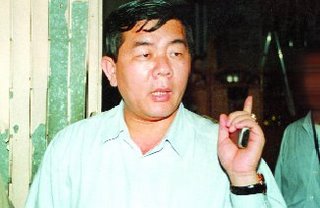 Suy Sem is the husband of Chea Kheng, the owner of KDC international which is involved in land dispute with villagers in Kampong Chhnang (Photo: CPP)
Suy Sem is the husband of Chea Kheng, the owner of KDC international which is involved in land dispute with villagers in Kampong Chhnang (Photo: CPP)Wednesday 16 September 2009
KI-Media
The Cambodia Daily reported in today’s edition that a lawyer for Chea Kheng, the wife of the CPP minister of Industry, Mines and Energy Suy Sem, issued a warning saying that mentioning Chea Kheng marital relationship with Suy Sem is grounds for “criminal charge for spreading disinformation.”
The warning was issued by lawyer Phat Pouv Seang to a reporter for The Cambodia Daily. Chea Kheng is the owner of KDC International, a company involved in land dispute with villagers in Kampong Chhnang province. In fact, during the phone call warning, Phat Pouv Seang did confirm that Chea Kheng is indeed Suy Sem’s wife, but the lawyer indicated that such information cannot be published in newspaper reports about land dispute issue. The lawyer also suggested that The Cambodia Daily issues a correction to its article.
According to Naly Pilorge of the Licadho’s human rights group, KDC is involved in land disputes with 108 villagers in Ta Ches commune, Kampong Tralach district, Kampong Chhnang province. Some of the villagers have agreed to sell their lands to KDC, but others did not. Nevertheless, KDC still claims the ownership of the entire area. This situation resulted in the land dispute.
The Cambodia Daily quoted Khieu Kanharith, the CPP minister of Information, as saying: “We can sue for disinformation when we know it is not true.”
Phat Pouv Sean is also defending Ieng Thirith, the wife of Ieng Sary, the former KR minister of Foreign Affairs. We were wondering whether revealing the fact that Ieng Thirith is Ieng Sary’s wife will earn us a disinformation lawsuit also?
The warning was issued by lawyer Phat Pouv Seang to a reporter for The Cambodia Daily. Chea Kheng is the owner of KDC International, a company involved in land dispute with villagers in Kampong Chhnang province. In fact, during the phone call warning, Phat Pouv Seang did confirm that Chea Kheng is indeed Suy Sem’s wife, but the lawyer indicated that such information cannot be published in newspaper reports about land dispute issue. The lawyer also suggested that The Cambodia Daily issues a correction to its article.
According to Naly Pilorge of the Licadho’s human rights group, KDC is involved in land disputes with 108 villagers in Ta Ches commune, Kampong Tralach district, Kampong Chhnang province. Some of the villagers have agreed to sell their lands to KDC, but others did not. Nevertheless, KDC still claims the ownership of the entire area. This situation resulted in the land dispute.
The Cambodia Daily quoted Khieu Kanharith, the CPP minister of Information, as saying: “We can sue for disinformation when we know it is not true.”
Phat Pouv Sean is also defending Ieng Thirith, the wife of Ieng Sary, the former KR minister of Foreign Affairs. We were wondering whether revealing the fact that Ieng Thirith is Ieng Sary’s wife will earn us a disinformation lawsuit also?





